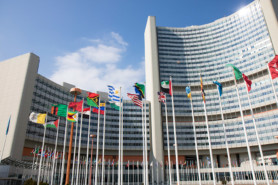Posted on 21 Jan 2019
The interlinkages between forms of organized crime and terrorism have been widely debated and documented. Terrorist and criminal actors often use similar means to achieve their goals, to the extent that distinguishing between what is a ‘criminal’ and a ‘terrorist’ act can be a difficult task. Similarly, many legal and policy responses to terrorism find parallels in approaches to countering organized crime.
Debates over the abuse of information and communications technologies (ICT) by terrorist groups underline these parallels, as the issues are similar to those surrounding approaches to cybercrime and cyber-enabled crime. An understanding of policy developments in both the counter-crime and counterterrorism arenas may therefore be helpful for policymakers in building a collaborative and effective response to a broad range of malicious actors online.
Michèle Coninsx, UN Assistant Secretary-General and Executive Director of the Counter-Terrorism Committee Executive Directorate (CTED), discusses why technology has taken centre stage on the UN counter-terrorism agenda, and the approaches the UN is promoting to tackle issues related to technology.
The internet and social media are increasingly used to facilitate various terrorist activities, including communications, incitement, radicalization, recruitment, training, preparation, planning, financing and collection of information. This means that we need to rethink our approach to counterterrorism, and understand how ICT can be abused by terrorists and other criminal actors.
The UN Security Council emphasizes the importance of digital technology when addressing the global threat of terrorism and encourages member states to develop cooperative activities in this area. Security Council Resolution 1373 calls on member states to find ways to intensify and accelerate the exchange of operational information on the use of ICT by terrorist groups, and to suppress terrorist recruitment, while Resolution 2129 (2013) acknowledges the evolving nexus between terrorism and ICT.
The work of the UN Counter-Terrorism Committee is paving the way for a more comprehensive approach to counterterrorism by mainstreaming ICT in the implementation of Security Council resolutions. Many of the challenges arising from the use of ICT in terrorist activities mirror experiences in combating organized crime and other forms of crime, such as cybercrime.
For one, digital evidence is a key issue in cybercrime debates at the UN. Preservation and collection of digital evidence have become key elements in the prosecution of criminals. There is a growing need for international cooperation to secure and obtain evidence from ICT service providers. Strengthening such cooperation would help track offenders and provide evidence against perpetrators of terrorist crimes.
Legal Access to Digital Data Across Borders – a joint initiative of the CTED, the UN Office on Drugs and Crime and the International Association of Prosecutors – was launched for this purpose. It seeks to enhance the capacity of investigators, prosecutors and central authorities involved in counterterrorism to obtain ‘e-evidence’ and to work with the private sector to bolster compliance with international law, in particular international human-rights standards.
Promoting self-regulation to prevent abuse
The need to engage the private sector is another objective in countering organized crime and terrorism. Tech Against Terrorism is a CTED initiative that advocates industry self-regulation and encourages ICT businesses to take more responsibility with regard to the misuse of their platforms. The CTED’s multifaceted approach here aims to disrupt terrorists’ ability to use the internet for their ends, while balancing such interventions with the need to respect human rights and fundamental freedoms.
The Security Council also underscores the need for member states to support Tech Against Terrorism and its strategic partner, the Global Internet Forum to Counter Terrorism (GIFCT). Launched by Facebook, Microsoft, Twitter and YouTube, GIFCT aims to develop technological solutions, conduct research and share knowledge that will help contribute to the global fight against terrorism.
Future challenges for the UN
Given the fast pace of technological innovation, the use of ICT in terrorism-related activities continues to evolve as a threat to international peace and security. By 2020, it is predicted that there will be more than 20 billion IoT (Internet of Things) devices connected to the internet. And the risk extends to industrial control systems and critical infrastructure. There is growing concern that terrorist groups may acquire the capacity to launch terrorist attacks through the internet, with destruction of vital infrastructure – such as energy, water-supply and transportation systems – on a massive scale; there are worrying reports that ISIL (Da’esh) and other terrorist organizations are seeking to recruit people capable of carrying out such attacks.
Security Council Resolution 2341 (2017) places a burden on the CTED to examine member states’ efforts to protect critical infrastructure from such terrorist attacks, and identify and disseminate good practices, while exploring vulnerabilities and future challenges in this field.
Advances made in the field of artificial intelligence, machine learning and big data also raise fundamental legal, ethical and cultural questions, and around how they might be used in counterterrorism. Used appropriately, these valuable technologies are beneficial not only to the fight against cybercrime, but also to scientific research, education and public health. However, they simultaneously present high-level risks for malicious use and abuses, including the emergence of new forms of terrorist violence and new opportunities to commit crimes, and damaging consequences related to manipulation and invasion of privacy.
Although ICT can be used for criminal, disruptive ends, it can also be harnessed as a powerful tool in counterterrorism and the fight against organized crime. ICT is a cross-cutting theme of the UN’s work, and crucial to our collective efforts to fully realize the Sustainable Development Goals. Ultimately, it is difficult to predict what precise impact ICT will have on terrorism in the future. We do know, however, that terrorist activities are here to stay, and therefore ICT will remain high on the UN’s counterterrorism agenda.



